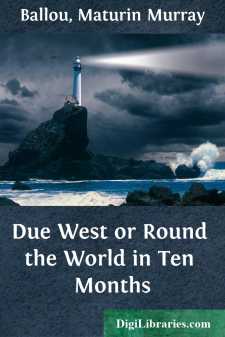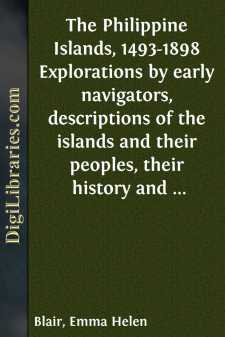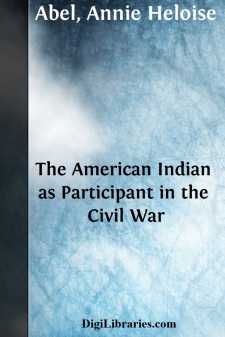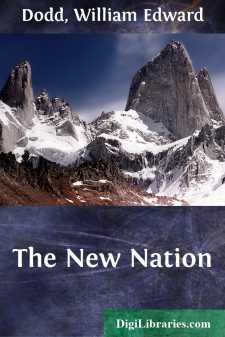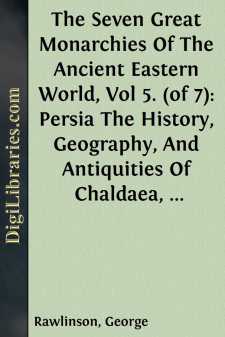History
- Africa 30
- Americas (North Central South West Indies) 50
- Ancient 68
- Asia 58
- Australia & New Zealand 8
- Canada 41
- Caribbean & West Indies 1
- Civilization 20
- Eastern Europe 12
- Europe 310
- Expeditions & Discoveries 60
- General 77
- Historical Geography 1
- Jewish 9
- Latin America 3
- Medieval 8
- Middle East 13
- Military 248
- Revolutionary 8
- Study & Teaching 5
- United States 353
- Western Europe 56
- World 13
History Books
Sort by:
PREFATORY NOTE. Twelve months ago, I began to collect the necessary material for the completion of "The Story of My Life," which my venerated and beloved friend, Dr. Ryerson, had only left in partial outline. These materials, in the shape of letters, papers, and documents, were fortunately most abundant. The difficulty that I experienced was to select from such a miscellaneous collection a...
more...
CHAPTER I. Synopsis of the Journey.—Crossing the Continent.—A Great Midland City.—Utah and the Mormons.—The Sierra Nevada.—San Francisco.—A Herd of Sea-Lions.—Possibilities of California.—The Love of Flowers.—Public School System.—Excursion to the Yosemite.—An Indian Stronghold.—Description of the Valley.—Passage of the Mountains.—Caught in a Snow-Storm.—A Forest of...
more...
by:
Richard Hakluyt
A voyage to the Azores with two pinases, the one called the Serpent, and the other the Mary Sparke of Plimouth, both of them belonging to Sir Walter Raleigh, written by John Euesham Gentleman, wherein were taken the gouernour, of the Isle of Sainct Michael, and Pedro Sarmiento gouernour of the Straits of Magalanes, in the yeere 1586. [Sidenote: The gouernour of S. Michael taken prisoner.] The 10. of...
more...
by:
Emma Helen Blair
Preface The scope of the present volume is confined to the year 1636, but enough of interest occurs within that time—thanks to the overflowing energy of the new governor, Corcuera, who promptly reorganizes all departments of the government; his controversies with the archbishop and the friars; and the difficulties and dissensions which affect the orders themselves. The greater part of this volume is...
more...
I. THE BATTLE OF PEA RIDGE, OR ELKHORN, AND ITS MORE IMMEDIATE EFFECTS The Indian alliance, so assiduously sought by the Southern Confederacy and so laboriously built up, soon revealed itself to be most unstable. Direct and unmistakable signs of its instability appeared in connection with the first real military test to which it was subjected, the Battle of Pea Ridge or Elkhorn, as it is better known...
more...
CHAPTER I THE CIVIL WAR The military successes of the United States in its Civil War maintained the Union, but entailed readjustments in politics, finance, and business that shifted the direction of public affairs for many years. In the eyes of contemporaries these changes were obscured by the vivid scenes of the battlefield, whose intense impressions were not forgotten for a generation. It seemed as...
more...
by:
Richard Hakluyt
NAVIGATIONS, VOYAGES, TRAFFIQUES, AND DISCOVERIES OF THE ENGLISH NATION IN ASIA. The manner of the entring of Soliman the great Turke, with his armie into Aleppo in Syria, marching towards Persia against the Great Sophie, the fourth day of Nouember, 1553, noted by Master Anthony Ienkinson, present at that time. There marched before the Grand Signior, otherwise called the great Turke, 6000 Esperes,...
more...
CHAPTER I. JANUARY."Come then, come then, and let us bringUnto our pretty Twelfth-Tide King,Each one his several offering."Herrick'sStar Song. Dedication Festivals—New Year's Day—"Wassail"—Twelfth Night—"King of the Bean"—St. Distaff's Day—Plough Monday—Winter Games—Skating—Sword-dancing. N the old life of rural England few things are more...
more...
by:
George Rawlinson
CHAPTER I. EXTENT OF THE EMPIRE. The geographical extent of the Fifth Monarchy was far greater than that of any one of the four which had preceded it. While Persia Proper is a comparatively narrow and poor tract, extending in its greatest length only some seven or eight degrees (less than 500 miles), the dominions of the Persian kings covered a space fifty-six degrees long, and in places more than...
more...
by:
William Lawrence
PREFACE. Sergeant William Lawrence died at Studland in Dorsetshire in the year 1867, bequeathing the manuscript of the accompanying autobiography to the family one of whose members now submits it to the notice of the public. Circumstances, which perhaps may be too often interpreted as really meaning an unfortunate tendency to procrastination, have hitherto prevented it being put into shape with a view...
more...



